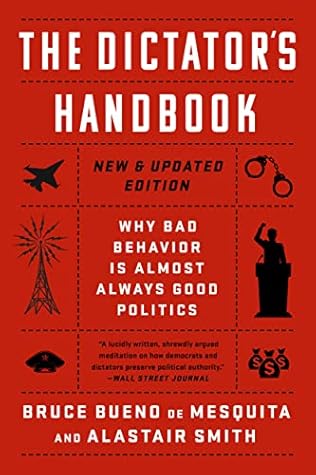More on this book
Community
Kindle Notes & Highlights
Read between
June 20 - August 9, 2021
teach us about the rules to rule by. First, politics is about getting and keeping political power. It is not about the general welfare of “We, the people.” Second, political survival is best assured by depending on few people to attain and retain office.
Third, when the small group of cronies knows that there is a large pool of people waiting on the sidelines, hoping to replace them in the queue for gorging at the public trough, then the top leadership has great discretion over how revenue is spent and how much to tax.
When addressing politics, we must accustom ourselves to think and speak about the actions and interests of specific, named leaders rather than thinking and talking about fuzzy ideas like the national interest, the common good, and the general welfare.
Politics, like all of life, is about individuals, each motivated to do what is good for them, not what is good for others.
the self-interested calculations and actions of rulers are the driving force of all politics.
To understand politics properly, we must modify one assumption in particular: we must stop thinking that leaders can lead unilaterally.
For leaders, the political landscape can be broken down into three groups of people: the nominal selectorate, the real selectorate, and the winning coalition.
Fundamentally, the nominal selectorate is the pool of potential support for a leader; the real selectorate includes those whose support is truly influential; and the winning coalition extends only to those essential supporters without whom the leader would be finished. A simple way to think of these groups is: interchangeables, influentials, and essentials.
Rule 1: Keep your winning coalition as small as possible. A small coalition allows a leader to rely on very few people to stay in power. Fewer essentials equals more control and contributes to more discretion over expenditures.
Rule 2: Keep your nominal selectorate as large as possible. Maintain a large selectorate of interchangeables and you can easily replace any troublemakers in your coalition, influentials and essentials alike.
Rule 3: Control the flow of revenue. It’s always better for a ruler to determine who eats than it is to have a larger pie from which the people can feed themselves.
Rule 4: Pay your key supporters just enough to keep them loyal. Remember, your backers would rather be you than be dependent on you.
Rule 5: Don’t take money out of your supporter’s pockets to make the people’s lives better.
Paying supporters, not good governance or representing the general will, is the essence of ruling.


